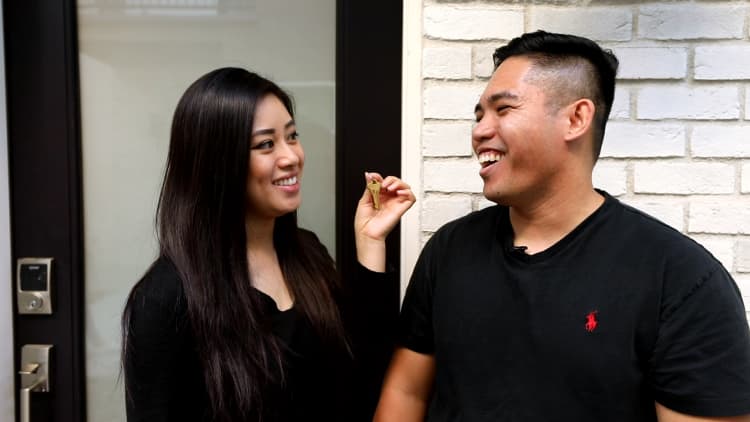"Talk about money with friends" is a popular piece of personal finance advice. Experts argue these conversations can help break down the taboos around the subject and hold you accountable to your goals. For women, talking to friends about salaries, negotiating and investing is painted as a sort of financial feminism.
Typically, when I read this advice, I nod my head and continue on to the next bullet point. Yes, of course we should all talk about our finances, especially women and minority groups who have historically been discouraged from having these conversations. But how many of us actually do?
Thanks to my job, it feels like I talk about money all the time. But I recently realized that I'm not actually having many in-depth conversations about finances with my friends. It might come up from time to time, but we rarely talk about the mechanics of our money or how it makes us feel beyond a simple "stressed."
I set out to change that this weekend by hosting a Money Salon, as one friend deemed it, with a few close friends at my apartment. Over some snacks and a few bottles of wine, we had a free-flowing and wide-ranging conversation about money. Our talk covered the philosophical, including discussing the moralistic language that accompanies a lot of financial advice, as well as the nuts and bolts of personal finance, like health-care costs and credit scores.
"It was so refreshing to just talk about money in general, even without a specific bone to pick," one friend texted me a few days later. "I felt so satisfied with the convo even though I didn't walk away with any official conclusions/a bunch of next steps/we didn't solve all our money problems."
And while we certainly didn't come up with a solution to the ridiculously high cost of medical care in the U.S., talking it out with each other, at least in my view, offered much needed money catharsis.
If you want to host your own Money Salon, here are some suggestions.
Invite friends who are comfortable around each other
This is crucial. The point of this exercise is to discuss your finances in a judgement-free zone. It's important for everyone to feel comfortable around each other, to not think that others in attendance will view them negatively or use what they say against them.

I kept my invite list to a core group of five girlfriends who knew each other well, and who I thought would be open to having an intimate conversation on a complicated topic. I specifically invited only women because research shows that men speak significantly more than women in meetings, and I wanted my guests to speak honestly, candidly and equally, without fear of interruption.
Set expectations ahead of time
This isn't to say you shouldn't invite someone who isn't friends with everyone in the group. But it's important to set expectations ahead of time and let everyone know you'll be openly discussing sensitive topics.
To that end, I sent an email invite to my friends detailing what we'd be talking about and why it's important. I noted that the details of what we discussed would stay strictly between us. And of course, I let my friends know I was writing about the experience, though I wouldn't use any identifying information.
When I first broached the subject with them, some were hesitant to join. One friend was clearly nervous about talking about a subject that causes her a lot of anxiety and shame. Another felt judged in the past for how much money she saves, and said she didn't want to come off as "preachy."
Those feelings are understandable, but I reassured my friends that the goal wasn't to tell each other how to live our lives, or take a moral high ground, as many people seem to do in our money-obsessed culture. It was simply to share our true feelings about money with friends who would acknowledge them and, perhaps, have some insight to offer.
Have topics ready...
If you're hosting, you'll want to brainstorm a few topics or questions ahead of time. To formulate my questions, I considered what I wanted out of the evening, and what would be a good topic to ease us all into the money talk. I landed on:
I'm curious how each of you grew up relating to money, and how that has played into your relationship with money and your finances now?
I like this question because it's not strictly about money — it's about emotions and family and how we relate to the world, which seem like lofty subjects but can actually be easier to answer than, what's your investment strategy? It's also open-ended, and each person can take it in any direction they choose.
... but let the conversation flow naturally
That said, if you are hosting you don't want to commandeer the conversation. Yes, break the ice with a question or two that everyone can answer, but it's good to follow where your guests lead.
I started asking about the money stories we grew up believing, and from there we talked about:
- Mental health, how it relates to money and how much it costs to see a therapist
- Health-care costs, even with "good" insurance
- Feeling guilty about spending money and how to overcome that
- How our upbringings influence how we related to money now
- If we think we'll be able to afford a house one day
- Student loans and Public Service Loan Forgiveness
- The mechanics of budgeting
- How to balance all of experiences we want to have with the high cost of living
- Credit cards and credit scores
Assuming your guests are friends you feel comfortable around, it's not hard to keep the conversation going. Be sure to ask your guests if they have questions or topics they want to tackle. And it's okay to talk about non-money subjects, too.
Now that we've built a foundation of trust, at the next salon I might suggest that we discuss one core topic, like salary negotiation or how we all budget. Inevitably, it will lead to other discussions, but that's a good tactic to get people focused and talking.
Ask questions
You don't have to be a reporter to ask engaging follow-up questions. If one of your guests says something personal or touches on something that made you think differently, don't move on to the next topic. Ask them for details about what they just said. That could be as simple as, "What makes you say that?" or, "I found what you said really interesting, but I'm not sure I understand completely. Can you explain that a bit more?"

This might seem basic, but I find it is incredibly important, especially if your friends seem unsure or uncomfortable. You want to let them know you heard them, and that you are invested in what they are saying and their thoughts and feelings.
Among my group of friends, the conversation flowed easy and, despite our different backgrounds, we found ourselves agreeing on and relating to each other on many topics. The most polarizing topic was budgets and whether they actually work. I offered to share my spending and saving worksheet, while a few others acknowledged sticking to arbitrary budgeting figures just doesn't work for them.
Be open to new perspectives
Often, we're advised to talk about money with friends for what could be considered selfish reasons: To learn about their investment strategy or how they asked for a raise, etc. But what this Money Salon taught me was that each of my friends have anxieties and opinions and beliefs that I wasn't privy to before, simply because we hadn't set aside time to talk about this one huge subject.
As one friend pointed out, money touches every aspect of our lives, and is often a source of anxiety or stress, or, on the flip side, joy, or even pride. Sure, twentysomethings are worried about dating and careers and one million other things, but for most of us, money — how much we're earning, what we're spending, how to manage debt — takes up a lot of mental space.
Talking about it for a few hours won't solve all of our problems. But it was therapeutic to hear my friends open up about the same issues I have with money. After, I felt a lot less guilty about my money habits, and I realized that most of us are just going the best we can with what we've got. And while I might talk about money a lot, there's always more to say.
Don't miss: I committed to a 'no-spend summer.' Here's how it changed my relationship to money
Like this story? Subscribe to CNBC Make It on YouTube!



